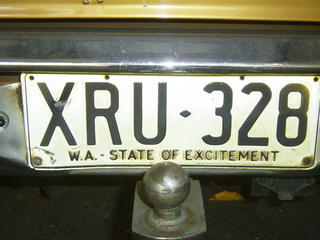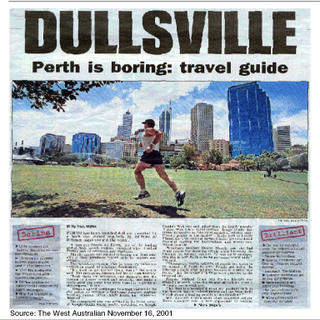
3. Names and politics
The origin of the term ‘State of Excitement’ is obscure. Each State and territory within Australia has a slogan to describe it: Queensland is the Sunshine State; Victoria is the Garden State. Each state also has a demonym for the people: West Australian’s are called sandgropers (see image) after rarely seen and poly-modular insects that burrow in the infertile, fine sands of the coastal plains. That sounds quite exciting; better than New South Welsh people who are nicknamed ‘cockroaches’, an
 d South Australians who are known as ‘crow eaters’. (Demonyms).
d South Australians who are known as ‘crow eaters’. (Demonyms).The Dullsville contorversy is cited as having arisen variously from an internet travel page labelling Perth the most boring city in the world and/or the Lonely Planet 2000 guide to Australia. These sources were not available to confirm this, though more recent guides, perhaps aware of their impact, have toned down their criticisms. The local press reacted to this accusation of lugubriousness instantly with a West Australian newspaper cover story that caused immens
 e backlash (see image; dated November 16, 2001). With an international reputation as good as News of the World, the West Australian can only be believed. A further article was published approx. 12 months later.
e backlash (see image; dated November 16, 2001). With an international reputation as good as News of the World, the West Australian can only be believed. A further article was published approx. 12 months later.Although you would be expected this name calling to be shrugged off, it appears to have struck deeply into the psyche of the state. The Dullsville issue is raised in official government documents from the Western Australian Planning Commission (WAPC; WAPC), local theatre productions (PICA theatre) and in broader public debate including international news site forums BBC news poll).
The WAPC stated the following in a 2003 policy document:
“But is Perth too pleasant? Detractors point to its blandness, or “dullsville” nature, with a conservative “no” attitude to new and innovative ideas. Fremantle and Subiaco are examples of communities where creative and artistic forces have emerged to create exciting and popular centres envied by others.”
A Sunday Times newspaper article was quoted with the following:
“A $190 MILLION plan to put underground a section of the rail line separating Perth from its main entertainment precinct would rid the city of its "dullsville" tag, Premier Geoff Gallop said today...”
(Business Australia discussion).
Dullsville is thus an issue of politics as much as anything else. As further proof, a mock Department of Foreign Affairs and Trade (DFAT) memo was sent across Australia warning of the ‘dangers’ of living in Perth (SMH news and ABC news). The tone of reporting of this incident in National media, as well as the spoof itself, reveal something of the cynicism of outsiders and the protectiveness of those at the source. Indeed, a past survey suggested a massive 72% of people did not think Perth was dull, but most of those who responded to the questionaire where fiercly tribal locals. (ozsurveys).
I have encountered the proud local nature first hand. When I first touched down on this distant shore I adopted my local personna to go undercover, introducing myself as Shane from Redfern in Sydney. My research suggested this was a simple, unassuming place, that would not generate predjudice. I asked one local about the reputation of Perth as boring. He looked at me with steely eyes as he mocked me in a slow drawl:
“Where are you from then if you’re not a local?”
“Sydney.”
He guffawed loudly and said “Sydney hey? I’ve been there once. Who’s got the pub there now?”
I think I understood his point. I relaised I must be careful. It is a tender issue below the idyllic surface. And if you look at facts, it is clear the Perthites, the Sandgropers, love their home and state, whereas others scorn its existence, much like Caligula scorned all of Rome in favour of the unlimited absurd.
So we must be careful not to trample on the happiness of others. We have a question that we must ask, knowing the answer may cause unrest. We know we will not be satisfied until we have travelled further, further into the twilight.

0 Comments:
Post a Comment
<< Home